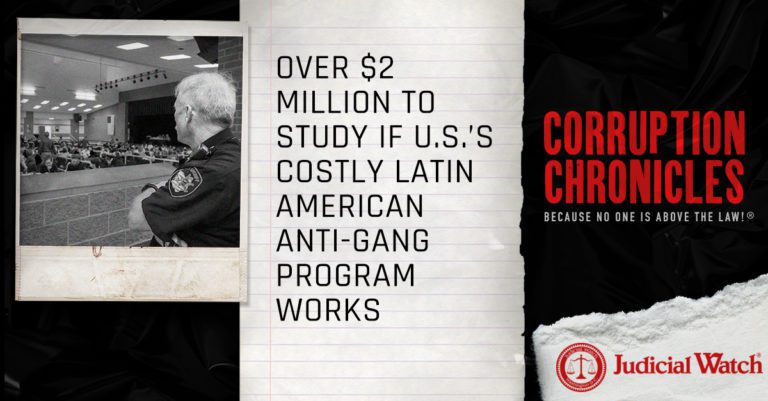

Over $2 Million to Study if U.S.’s Costly Latin American Anti-Gang Program Works


In yet another example of taxpayer money going to waste, the U.S. government is spending north of $2 million to research if a costly, decade-old Latin American gang prevention initiative is working. Since 2010 Uncle Sam has funded a program called Gang Resistance Education and Training (GREAT) in El Salvador, Honduras, Panama, and Costa Rica but no one really knows if it has met its mission of preventing youth crime, violence, and gang involvement. The program operates in schools throughout the U.S. using thousands of law enforcement officers to help immunize children in the years immediately before the prime ages for introduction into gangs and delinquent behavior. Nevertheless, there are approximately 30,000 gangs and 850,000 gang members throughout the U.S., according to the Department of Justice (DOJ).
Domestically GREAT is funded and overseen by the DOJ Office of Juvenile Justice and Delinquency Prevention (OJJDP). In foreign countries, the program is run by the State Department’s Bureau of International Narcotics and Law Enforcement Affairs (INL), which works to keep Americans safe by countering crime, illegal drugs, and instability abroad. INL is handsomely funded by Congress and this fiscal year the State Department requested $456.8 million for its drug-related programs. The funds help strengthen the rule of law, human rights protections, law enforcement capacity, anti-corruption activities, and other critical efforts around the globe, according to the budget request. Besides financing GREAT, the U.S. has dedicated hundreds of millions of dollars to fighting gangs, crime and drug trafficking in the region through the State Department’s Central American Regional Security Initiative (CARSI), which also focuses on gang prevention and social programming for at-risk youth.
It is difficult to say how successful CARSI has been since the region remains a hotbed of crime, gangs and drug-trafficking that is reportedly fueling the current illegal immigrant crisis. Latin America is the world’s most violent region, according to a study published by Florida International University (FIU). The report includes figures released over the last decade by the World Health Organization (WHO) and United Nations Drug and Crime Office (UNODC) that show, when compared to other world regions, crimes in Latin America tend to be more violent, murder is committed more frequently, and the threat or use of physical force is more common. Additionally, Latin America’s average prison population rate is more than double that of the world, the academics found.
It does not appear that the monstrous U.S. investment to counter crime and drugs in Latin America is having much of an impact. For 11 years the costly venture has included GREAT for at-risk youth in the four Central American countries listed above. Government figures show that 487,890 at risk youth in Honduras, 170,767 in El Salvador, 150,000 in Panama, and 45,685 in Costa Rica have completed the U.S.-financed program in the last decade, but outcomes are unknown. So, the government will dole out an additional $2,025,000 to organizations or academics that will provide in-depth outcome evaluations, according to a grant announcement published by the State Department’s INL. The studies will help the government determine changes in levels of gang affiliation, levels of violence perpetration, attitude toward the police, and perception of police in their communities, among the graduates in comparison with students who have not been exposed to GREAT.
Grant recipients will gather scientifically validated data sources and conduct studies with kids who have completed the GREAT curriculum since 2010 and their teachers, school principals, and parents. “In order to better understand to what extent and how results were achieved, the implementer’s research team will conduct an analysis of the most relevant factors contributing to results, challenges hindering impact, and any unintended outcomes (if applicable),” the grant announcement says, adding that “INL seeks to understand the effectiveness of the G.R.E.A.T. program.” American taxpayers will dish out $800,000 to research GREAT outcomes in Honduras, $600,000 in El Salvador, $475,000 in Panama, and $150,000 in Costa Rica over the next three years. “This study will provide relevant information for police in the target countries to tailor their approaches to at-risk youth and countering gang violence,” according to INL.















